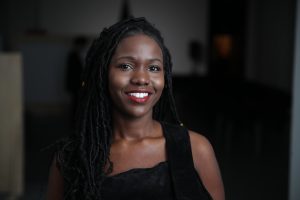The Path to Remembering
This essay was written by 2020 Emerging Voices Fellow M. Kiguwa at the culmination of the fellowship.

M. Kiguwa
Amor Fati is Latin for “love of fate” or “love of one’s fate.” Some philosophers have used it to describe an attitude in which one sees everything that happens in one’s life, including suffering and loss, as good, or at the very least necessary. Others understand it as the idea that everything recurs infinitely, which poses the question of whether we are living in a way we would be willing to repeat over and over for all eternity.
Often in my day to day life, I’m riddled with questions about my work—could I be writing faster? Could I have finished this manuscript a long time ago? How long, exactly, will this take to finish?
What this fellowship has shown me is the power of being right on time, that the story is the story is the story—regardless of my material demands on the process.
When I met my cohort for the first time in a coffeeshop in downtown Los Angeles, I told them I really wanted to write a grounded story. My hope, I told them, was to make my memoir less ethereal and to bring it into the real world where me and my characters lived.
What I didn’t know I was asking for were the many eyeballs, the many hands, the many opinions that would nudge, shake, and propel me from the isolated private corners I’d been writing, into a sort of open space, where suddenly I had to account for every word, every myth, every character.
Where is this happening? I was frequently asked.
How does the protagonist even know this? I was questioned.
Can you bring us closer? I was pushed.
And so, while the process felt raw, unfamiliar, vulnerable—I had to look past the work and ask myself, What story am I trying to tell? Whose story am I trying to tell? And who am I writing for?
As I started sitting with the pages—a reckoning began. I realized I wanted to write for women like me, women who want to read stories about dark, black ingenues; women who want to remember how ancient and divine their femininity is; women uninspired and uninterested in most heteronormative tropes about sexuality and respectability.
Growing up, the incessant question in my soul seemed to be: is this it? Is this all life is?
And these questions catalyzed me to travel to far flung places searching for those other wild-wolf people, like me, who remembered themselves Viking and Bedouin, conquered and conqueror, king and leper, queen and maiden.
I had to realize that what I wanted to really write about, what was worth writing about, was how my journey has brought me back to a place of remembering. That what was stolen from the African continent and from those kidnapped on her shores, was the knowledge of our gods and goddesses, our chants and our prayers, our cosmologies and epistemologies, our libraries—written and oral, our stories—fabled and historical.
What I wanted to write is that I have a body. If I were to believe this particular juncture of time and space, a few thousand years after patriarchy, a few hundred years from the transatlantic slave trade, decades after African independence, but a decade or two after Africa’s descent into corruption—then this body would feel quite ashamed of itself. This body would feel too dark, too loud, too cumbersome, too ugly, too stout, too fat, too, too, too.
But remembering—moving past the vortex of Western amnesia—the drums we were told not to drum, the ululations we were forbidden, the gyrations we were called lewd and savage for practicing, has been the greatest gift I have given myself, and in return, the greatest gift I offer whomever chooses to read my memoir.
Which brings me back to Amor Fati.
That the journey is sometimes hard and unscrupulous, and yet yes, I would live this life over and over.
All paths lead to wherever they were intended to go.
This year, the path led me to PEN America, where I was asked necessary questions, where I found necessary answers.
Toni Morrison once wrote: “You know, they straightened out the Mississippi River in places, to make room for houses and livable acreage. Occasionally the river floods these places. “Floods” is the word they use, but in fact it is not flooding; it is remembering. Remembering where it used to be. All water has a perfect memory and is forever trying to get back to where it was. Writers are like that: remembering where we were, that valley we ran through, what the banks were like, the light that was there and the route back to our original place. It is emotional memory—what the nerves and the skin remember as well as how it appeared. And a rush of imagination is our ‘flooding.’”
I’m grateful for this fellowship for letting the flood in, for encouraging the dams to break, for showing me I won’t die if the levees fall. I’m grateful for the hands that urged me to let the river take me where it needed to take me—to say “yes” to the yield and to let the rush of raging water ride me back to my original place.






